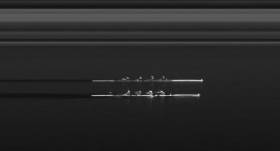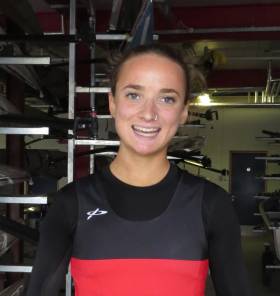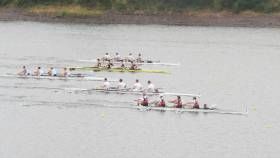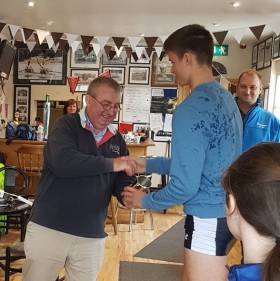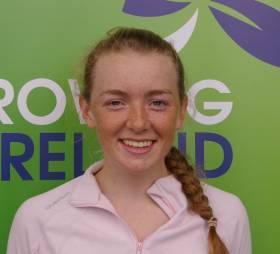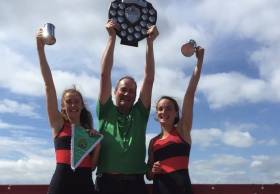Displaying items by tag: Lee
#Rowing: UCD won only their second senior men's eights Championship of Ireland since 1973 at the National Rowing Centre today. They last won in 2011. They had a clearwater lead by half way and never let it go.
The senior women's eight saw NUIG/Castleconnell also win well. The stern pair of Sadhbh O'Connor and Fiona Murtagh were taking their fourth titles of the weekend.
The final session of the Irish Championships started with a UCD win in the men's novice eight and continued with Ruth Morris of Commercial moving well clear to win the women's intermediate sngle sculls.
Colaiste Iognaid won a battle with Commercial in the men's junior pair, while Lee's junior women matched their junior men by winning the quadruple.
The final race of the whole event, the men's intermediate double, was won by Skibbereen.
Cork Clubs on a Run at Irish Championships
#Rowing: Cork clubs had a set of good results in the first session of Sunday finals at the Irish Rowing Championships at the National Rowing Centre.
Cork Boat Club's junior women's pair started the ball rolling, while Skibbereen then took their second title of Championships as Aodhan Burns proved a strong winner of the lightweight single sculls.
Margaret Cremen of UCC had a huge win in the lightweight single sculls, and Lee added the junior men's double to the junior quadruple title they had won on Saturday.
The tighest finish came in the men's club coxed four. NUIG made a tremendous effort to catch St Michael's of Limerick but they fell short by just .329 of a second.
Commercial of Dublin and Fermanagh's Enniskillen Royal Boat Club are having a good reatta. Enniskillen won the men's intermediate pair, while Commercial won the womens intermediate coxed four.
#Rowing: Seven different clubs won in the second session of finals on the second day of the Irish Championships. The races were run in hot sunshine.
Two women's finals senior finals were won in emphatic fashion. Georgia O'Brien of Kenmare won in the women's senior single sculls to give the club its second Championship. NUIG were also well in control in their victory in the women's senior pair.
Sadhbh Scully of Carlow, who is a junior, followed the trend in her big win in the women's club single sculls.
The women's junior 18 eights was a tighter affair, though Bann, once in the lead, held on strongly to rebuff Enniskillen.
The men's junior quadruple was a big event, with Lee taking the title ahead of Three Castles and Neptune.
Cork clubs are having a good Championships, and UCC took the women's club eights.
Skibbereen figured strongly in some finals, but had their first Championship win when Kealan Mannix won the intermediate single sculls from Shane Haugh of Castleconnell.
Cremen and Dorney Top Rankings on Cork Sculling Ladder
#Rowing: Jack Dorney of Shandon and Margaret Cremen of Lee were the overall winners of the Cork Sculling Ladder. The presentations will take place this Thursday (January 31st) at Cork Boat Club. The Ladder is sponsored by Argos Fire.
Cork Sculling Ladder - Overall Winner : (1) Jack Dorney - Shandon Boat Club.
Women’s Overall Winner: (13) Margaret Cremen - Lee Rowing Club (retained)
Section Winners
Men
Jack Dorney - Shandon Boat Club, Open, Intermediate, Club 1, Club 2, Junior 18 and Junior 16
Jack Kiely - Lee Rowing Club, Novice
Peter Leonard - Cork Boat Club, Junior 15 and Junior 14
David Ross – Chu - Shandon Boat Club, Junior 13
Cian Dunlop - Lee Rowing Club, Junior 12
Donal Smith - Shandon Boat Club, Masters A & B
Henrik Merz - Shandon Boat Club, Masters C
John O’Neill - Shandon Boat Club, Masters D
Tony Corcoran - Lee Valley Rowing Club, Masters E, F, G & H
Women
Margaret Cremen - Lee Rowing Club, Open, Intermediate and Junior 18
Aoife Lynch - Lee Rowing Club, Club 1, Junior 16 and Junior 15
Claragh O’Sullivan - Cork Boat Club, Club 2
Maeve Coakley - Lee Rowing Club, Novice
Jennifer Forde - Shandon Boat Club, Junior 14
Isobel McElwain - Lee Rowing Club, Junior 13
Emer Hannon - Lee Rowing Club, Junior 12
Jessica Legresly - Shandon Boat Club, Masters A & B
Vivian Kelleher - Lee Rowing Club, Masters C
Liz Buckley - Lee Rowing Club, Masters D
Cork Clubs Come to Fore at Irish Rowing Championships
#Rowing: UCC brought their title tally to three as they added the club coxed four to their club eights and intermediate single sculls pots at the Irish Rowing Championships today. The four was tested by four other crews coming to the line but broke free and won. The morning session on the Sunday was held in intermittent light rain.
Margaret Cremen won the women’s lightweight single sculls. The Lee woman looked dominant through much of the race, but as she approached the line she was hunted down by Orla Hayes of Skibbereen, who closed to just a few seconds on the line. Hayes’s clubmate, Aodhan Burns, left no doubts as to his intentions in the men’s lightweight single. He left the rest behind and won well.
The men’s intermediate pair gave Shandon a chance to demonstrate the depth of their talent pool. Stephen O’Sullivan and Colm Hennessy teamed up to win. The Castleconnell junior double of James Desmond and Rory O’Neill came under pressure from Lee in their win.
One of the closest races in the Championships so far came in the women’s intermediate four. Leaders Trinity were pipped on the line by Cork, whose winning margin was under a third of a second (.312).
Killorglin’s Anna Tyther and Rhiannon O’Donoghue gave Fermoy a test in the women’s junior pair. Gill McGirr and Eliza O’Reilly are an excellent crew, however, and held off their Kerry rivals.
Irish Rowing Championships, Day Three (Selected Results)
Men
Four – Club, coxed: UCC A 6:38.03.
Pair – Inter: Shandon A 6:56.07.
Sculling, Double – Junior: Castleconnell (R O’Neill, J Desmond) 6:49.97.
Lightweight Single: Skibbereen (A Burns) 7:20.56.
Women
Four – Inter, coxed: Cork 7:22.36.
Pair – Junior: Fermoy (E O’Reilly, G McGirr) 7:48.69.
Sculling, Lightweight Single: 1 Lee (M Cremen) 8:06.97.
#Rowing: Two strong senior composite crews took home the Division One quadruple titles as the action concluded late into the evening on the first day of Cork Regatta at the National Rowing Centre. The women’s final saw Margaret Cremen join Skibbereen’s Lydia Heaphy, Denise Walsh and Aoife Casey to good effect, and the men’s winners were the prospective Ireland Under-23 lightweight quad. Workmen’s and Shandon junior 18 crews were good runners up in the women’s and men’s races.
Cork Boat Club won the Division One men’s coxed four title, while Trinity took the women’s.
Cork Regatta, National Rowing Centre (Selected Results)
Men
Eight – Div Two: Neptune (club two) 6:22.95; 4 Trinity (nov) 6:34.32; 5 Col Iognaid (jun 16) 6:35.63; 6 Shandon (jun 18B) 6:43.79.
Four – Div One, coxed: Cork (inter) 6:34.299; 3 Enniskillen A (jun 18A) 6:39.299. C Final: 2 Neptune (club one) 6:48.37.
Pair – Div One: 1 UCD (S Mulvaney, D O’Malley; sen) 6:53.31, 2 Skibbereen (M O’Donovan, S O’Driscoll; sen) 6:59.98, 3 Enniskillen (jun 18A) 7:06.75; 6 Cork A (inter) 7:23.68. B Final: 6 Neptune A (club one) 7:24.50.
Sculling, Quadruple – Div One: 1 Tara, UCD, Commercial, UCC (sen) 6:00.93, 2 Shandon (jun 18) 6:10.96
Double – Div Two: CRCC (jun 18B) 7:06.99; 5 Cork A (jun 16) 7:15.37. B Final: Cappoquin (club two) 7:20.43
Single Sculls: 1 Skibbereen (P O’Donovan; sen) 6:59.73. B Final: UCC (H Sutton; lwt) 7:20.63. C Final: 1 Shandon (E Gaffney; jun 18A) 7:28.92; 2 Queen’s (N Hull; inter) 7:29.86
Women
Eight- Div Two: Trinity A (club two) 6:52.696; 6 Commercial (jun 16) 7:15.45. B Final: 1 Queen’s (nov) 7:19.09.
Four, coxed – Div One: 1 Trinity (inter) 7:25.63, 2 Commercial (sen) 7:30.06; 5 Shandon (club one) 7:46.78.
Pair – Div One: 1 Skibbereen (A McCarthy, N Casey; sen) 7:49.73; 4 Col Iognaid (Jun 18A) 8:07.86; Shandon (club one) 8:08.78. C Final: 4 Shandon (inter) 8:36.00.
Sculling, Quadruple – Div One: 1 Skibbereen/Lee 6:50.49; 2 Workmen’s (jun 18A) 7:05.596. Div Two: 1 Cork A (club two) 7:50.05; 3 Carlow (jun 16) 8:03.97. B Final: Carlow (jun 18B) 8:13.43; 4 Queen’s (nov) 8:25.47.
Double – Div Two: 1 Killorglin (jun 18B) 7:41.63, 2 New Ross (club two) 7:56.41, 3 Carlow (jun 16) 8:00.41
Dorney and Cremen Top Rankings at Cork Sculling Ladder Trial
#Rowing: Jack Dorney of Shandon Boat Club was the fastest at the Cork Sculling Ladder time trial at the Marina. More than 170 single scullers participated on Sunday in the 46th running of the event, which is sponsored by Argos Fire and Safety Ltd and BioAugmentation Systems Ltd. Dorney won in a time of seven minutes and 7.2 seconds. Three other Shandon scullers filled the next three spots: Alex Byrne, Stephen O’Sullivan and Eoin Gaffney.
Margaret Cremen, who won last last year, was again the fastest woman – the Lee Rowing Club competitor finished 10th overall; Cork Boat Club’s Lisa Dilleen was the next fastest woman. Conditions on the river were calm.
The 2017-2018 Cork Sculling Ladder continues until April 1st.
Cork Sculling Ladder, Time Trial, October 8th. Selected Results:
- Jack Dorney, Shandon Boat Club. 7 min 07.2 sec
- Alex Byrne, Shandon Boat Club. 7:15.8
- Stephen O’Sullivan, Shandon Boat Club. 7:17.7
- Eoin Gaffney, Shandon Boat Club. 7:18.5
- Cian O’Sullivan, Cork Boat Club. 7:25.1
10. Margaret Cremen, Lee Rowing Club. 7:37.9
23. Lisa Dilleen, Cork Boat Club. 8:06.3 (8:07.6)
31. Aoife Lynch, Lee Rowing Club. 8:19.6
#Rowing: Ireland have qualified for the semi-finals of the women’s double sculls at the World Rowing Junior Championships in Trakai, Lithuania. Aoife Casey and Margaret Cremen finished third in their quarter-final. Canada, who led from the early stages, won well. Ireland had tracked them, holding second from before halfway until the final stages when the Netherlands got ahead of them.
World Rowing Junior Championships, Trakai, Lithuania, Day Three (Irish interest)
Women
Double Sculls – Quarter-Final Three (First Three to A/B Semi-Finals; rest to C/D Semi-Finals): 1 Canada 7:23.78, 2 Netherlands 7:29.52, 3 Ireland (A Casey, M Cremen) 7:30.27; 4 Austria 7:33.56, 5 New Zealand 7:36.51, 6 Estonia 7:52.65.
#Rowing: Skibbereen added four titles to their already weighty tally on the first day of the Irish Rowing Championships at the National Rowing Centre today. Paul O’Donovan won the senior single sculls and teamed up with Mark O’Donovan, Shane O’Driscoll and his brother Gary in the senior four – both were done in new record times for the course. Paul and Gary also won the senior doubles. The Skibbereen women’s four also won well, in a new best time for the course.
NUIG also took four titles: the men’s intermediate coxed four and club eight and the women’s club coxed four and novice coxed quadruple.
Cork Boat Club proved best in the women’s intermediate eight and also won perhaps the best race of the day: Barry O’Flynn was severely tested by Jack Dorney in the junior single sculls but fought back after being passed and won by a length.
The Old Collegians victory in the women’s senior double was straightforward: Sanita Puspure and Claire Lambe were by far the best crew.
This was the last final of the day, while UCC had won the first, taking the men’s novice coxed quadruple.
Neptune and St Joseph’s tried to rein them in, but the men’s junior eights final was a surprsingly straightforward affair for winners Enniskillen, who also won the women’s junior four. Lee’s Margaret Cremen and Aoife Lynch were also in control in the women’s junior double, as were Hannah Scott and Katie Shirlow in the intermediate pair.
Irish Rowing Championships, National Rowing Centre, Day One (Selected Results)
Men
Eight – Club: NUIG 5:53.60. Junior: Enniskillen 5:47.96.
Four – Senior: Skibbereen 5:55.33. Inter, coxed: NUIG 6:13.38.
Sculling, Quadruple – Novice, coxed: UCC 6:39.37.
Double – Senior: Skibbereen 7:06.89.
Single – Senior: Skibbereen (P O’Donovan) 6:48.19. Junior: Cork (B O’Flynn) 7:04.06.
Women
Eight – Intermediate: Cork 6:22.06.
Four – Senior: Skibbereen 6:40.58. Club, coxed: NUIG 7:10.92. Junior: Enniskillen 6:57.94.
Pair – Inter: Bann 7:19.32.
Sculling, Quadruple – Novice, coxed: NUIG 7:36.02. Double – Senior: Old Collegians 6:59.997. Junior: Lee 7:09.86.
#Rowing: Barry O’Flynn of Cork Boat Club came from behind to win the junior single sculls title at the Irish Rowing Championships in Cork today. Jack Dorney of Shandon tested the favourite in an exciting race – and went ahead. O’Flynn came back and won by a length.
Two of the top junior women were involved in impressive wins. Hannah Scott teamed up with Katie Shirlow to win the intermediate pairs for Bann, while Margaret Cremen and Aoife Lynch won the junior doubles.
NUIG won two sucessive finals, the women’s club coxed four and the men’s intermediate coxed four, while UCC had started the first session of finals at the Championships with a win in the novice coxed quadruple.
Skibbereen called on the class of their international brigade to also win twice: Paul and Gary O’Donovan were untested in their senior doubles win, while Denise Walsh stroked the women’s senior four to a fine win over UCD.
Irish Rowing Championships, National Rowing Centre, Day One (Selected Results)
Men
Four – Inter, coxed: NUIG 6:13.38.
Sculling, Quadruple – Novice, coxed: UCC 6:39.37.
Double – Senior: Skibbereen 7:06.89.
Single – Junior: Cork (B O’Flynn) 7:04.06.
Women
Four – Senior: Skibbereen 6:40.58. Club, coxed: NUIG 7:10.92.
Pair – Inter: Bann 7:19.32.
Sculling, Double – Junior: Lee 7:09.86.


























